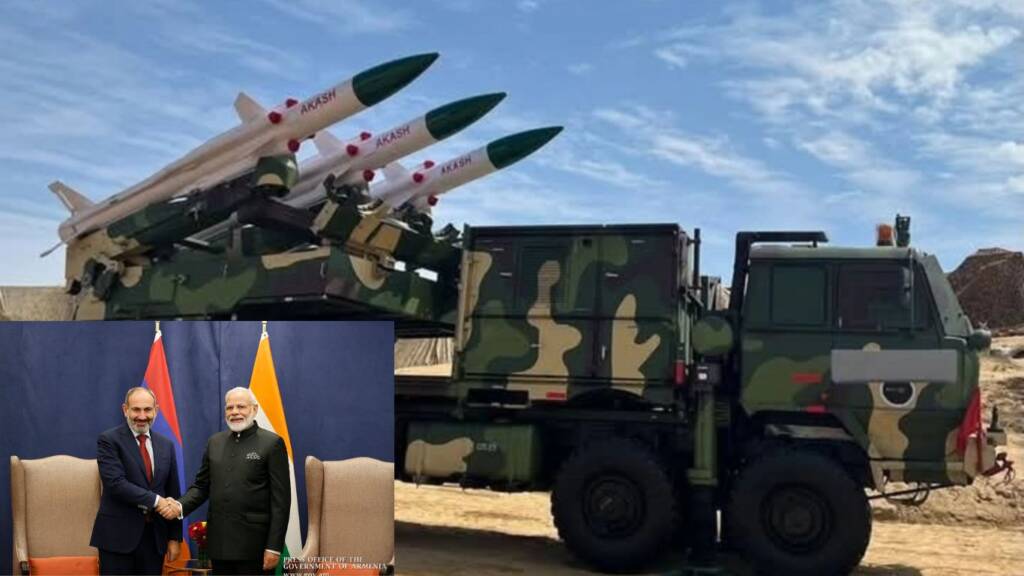Armenia has become the first country to purchase India’s indigenously developed Akash missile system. Recently, the indigenous missile has shown its successful use in the recent India-Pakistan conflict, Operation Sindoor. India is preparing to deliver the second unit of it in July. India’s defence exports send a clear strategic message to regional players, especially Turkey, which has shown strong military support for Pakistan in recent years.
A Strategic Partnership Takes Off
The Akash missile deal between India and Armenia was first signed in 2022, with Armenia agreeing to buy 15 Akash missile units for approximately ₹60 billion. The first battery was delivered in November 2024, and the second batch is scheduled for dispatch this July. This deal not only marks a breakthrough for India’s defense industry but also showcases the growing defense cooperation between India and Armenia.
Armenia’s decision to acquire the Akash system comes at a time when it is actively seeking to diversify its arms suppliers. With longstanding reliance on Russian military hardware—Russia accounted for 94% of Armenia’s arms imports between 2011 and 2020—Yerevan is now turning to new partners due to Moscow’s delivery challenges amid the war in Ukraine. India, with its growing defense capabilities, has stepped in to fill this gap.
Akash Proves Itself in Combat
The Akash missile system, developed by the Defence Research and Development Organization (DRDO), played a key role during Operation Sindoor, a recent escalation between India and Pakistan this month. During this conflict, Akash was instrumental in countering sustained aerial attacks from Pakistan, demonstrating high levels of accuracy, mobility, and resilience.
The system is equipped with a powerful 3D radar (Rajendra) that can track multiple targets, including low-flying aircraft and drones. Its built-in electronic counter-countermeasures (ECCM) allow it to operate effectively even when enemy forces attempt to jam or deceive its radar systems. The success of Akash in this real-world scenario has added to its credibility as a robust defense solution.
A Message to Turkey
Armenia’s purchase of the Akash system is not just a defense deal—it carries geopolitical weight. Turkey, a close ally of Pakistan, has supported Azerbaijan in its conflict with Armenia and has strengthened defense ties with Islamabad in recent years. Turkey has given drones to Pakistan, which have been used in the recent conflict. By supplying advanced missile systems to Armenia, India is sending a strong message to Turkey: if you arm our adversary, we have the means and the will to arm yours.
This move also signals India’s readiness to play a larger role in global arms exports, particularly in regions where its strategic interests align. It shows that India is not just a buyer in the global defense market but also a credible supplier capable of supporting allies and partners with cutting-edge technology.
A New Defense Landscape for Armenia
Armenia’s broader defense diversification strategy includes over $1.5 billion in arms purchases from India between 2022 and 2023, including Pinaka rocket launchers, ATAGS artillery, and various anti-tank and counter-drone systems. France has also emerged as a new defense partner, with deals worth $250 million. Meanwhile, Armenia’s older contracts with Russia remain partially fulfilled, highlighting the challenges Yerevan faces in maintaining its traditional military partnerships.
Despite its deep economic ties with Russia—over 41% of Armenia’s trade in 2024 involved Russia—the political and military landscape is changing. Armenian officials have acknowledged that public trust in Russia has declined, especially following Moscow’s muted response during recent border conflicts with Azerbaijan.
A strategic move
By becoming the first international buyer of the Akash missile system, Armenia has not only strengthened its air defense capabilities but also deepened its strategic partnership with India. For India, this marks a proud moment where indigenous defense technology has proven itself in battle and found trust abroad.
More importantly, this development sends a broader geopolitical message: India is ready to support its partners, especially when its own strategic interests are at stake. As tensions continue in various parts of the world, such defense ties are set to play an increasingly important role in shaping alliances and power balances.
